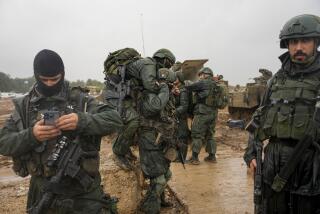Iraqi militants claim to hold U.S. soldiers
BAGHDAD — A militant group tied to Al Qaeda claimed Sunday to be holding three American soldiers missing since an ambush that left four U.S. troops and an Iraqi interpreter dead.
Across Iraq, bombs, mortar shells and gunfire killed more than 50 people Sunday, including 16 in a Baghdad market that has been a frequent target of bombings and other attacks.
The statement from the Islamic State of Iraq came as thousands of U.S. and Iraqi security forces combed the “triangle of death,” an area southwest of Baghdad that is a stronghold of Sunni Muslim insurgents.
Three U.S. soldiers disappeared after the Saturday morning ambush 12 miles west of Mahmoudiya.
The military did not identify the U.S. troops, and did not reveal their combat unit, but some new details of the incident emerged.
At least one victim suffered gunshot wounds, though it was unclear whether he was shot before or after blasts enveloped the soldiers’ two vehicles in flames, said U.S. Army Lt. Col. Christopher Garver, a military spokesman.
An Army Quick Reaction Force, deployed about 15 minutes after the 4:44 a.m. attack, had to avoid a roadside bomb in its path as it headed toward the scene in the darkness, Garver said.
The force arrived about 40 minutes later, he said. “This is not like responding to a two-alarm fire on Sunset Boulevard. They can’t just drive up. You have to be wary along the way.”
There was no way to verify the militant group’s claim, which appeared on its website. Islamic State of Iraq, a coalition of Sunni groups loyal to Al Qaeda, offered no photographic evidence to back it up.
The area of the attack is a stronghold of anti-American insurgents. Two U.S. soldiers were captured there and slain last year. Another group loyal to Al Qaeda claimed to have captured and killed the men. The Army came under criticism after the incident for having allowed the unit to operate in such a dangerous area without helicopter support.
In the latest incident, there were two vehicles in the patrol, but it was unclear what the troops were doing when they came under attack. One military official said it appeared the soldiers had been stationary, indicating that they may have been guarding a checkpoint.
About 4,000 troops backed by helicopters and spy planes searched the region, following up on tips from residents, Garver said.
Two other soldiers died in bomb blasts Sunday, one near Haditha, in Al Anbar province, and another in Salahuddin province, north of Baghdad, the U.S. military said. The deaths brought to 3,396 the number of U.S. troops killed in Iraq since the U.S.-led invasion of March 2003, according to icasualties.org, a website that monitors war-related deaths and injuries.
In northern Iraq, officials blamed Al Qaeda for a massive bomb that tore through a street in downtown Makhmur, about 150 miles north of Baghdad. At least 32 people died and 115 were injured.
In the capital, residents of the mainly Shiite Muslim district of Sadriya were reeling after a blast that killed 16 people, the third major bombing there since February.
Sadriya abuts Fadhil, a Sunni Muslim neighborhood where U.S. forces often clash with suspected insurgents. Survivors complained that a U.S.-Iraqi security plan launched in mid-February, aimed at taming sectarian violence, had failed to protect Sadriya.
“This whole security plan is a joke,” said Jaffar Mousa, who was wounded by flying glass when the blast tore through his shop.
Police had erected checkpoints at the entrance to the market because of the previous attacks, but the bomber managed to park a car laden with explosives close enough to cause massive casualties when it blew up at 2:45 p.m.
Charred corpses lay on the streets, and the injured were bundled onto wooden carts and wheeled from the scene. “There was blood pooling on the street and pieces of flesh were everywhere,” said Mousa, adding that it took rescue vehicles a long time to reach the scene because they could not drive through volatile Fadhil.
The Makhmur attack marked the second time in five days that the relatively placid Kurdistan region had been rocked by violence. On Wednesday, at least 19 people died when a suicide bomber detonated his vehicle in Irbil, 220 miles north of Baghdad.
Throughout the area, tension has been high between Kurds and Arabs, many of whom moved to northern Iraq during the late former President Saddam Hussein’s campaign to dilute Kurdish influence in the region. Since Hussein’s ouster and subsequent execution, Kurds have attempted to reclaim seized property, and Arabs have been driven out.
Elsewhere in the Kurdish region, eight people were slain in Mosul, including two men who had been high-ranking members of Hussein’s Baath Party.
Also Sunday, a mortar round struck a bakery in a busy section of northeastern Baghdad, killing three people. The bodies of 22 men, all apparent victims of sectarian death squads, were found across the capital, police said.
Times staff writer Ned Parker
in Baghdad, special correspondent Abdulsalam Madani in Irbil and correspondents in Baghdad contributed to this report.
More to Read
Sign up for Essential California
The most important California stories and recommendations in your inbox every morning.
You may occasionally receive promotional content from the Los Angeles Times.










